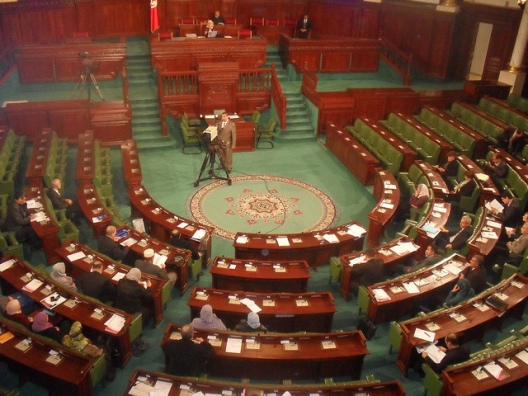 The process of drafting the Tunisian constitution, now awaiting its final phase of approval from the National Constituent Assembly (NCA), has been in some ways a debate about the nature of Tunisian society. When it is passed, the question on many minds will be the extent to which the document is progressive or conservative in the social values it puts forward. Common litmus tests, at least in the American and European media, are the constitution’s treatment of Islam, and of the rights of women.
The process of drafting the Tunisian constitution, now awaiting its final phase of approval from the National Constituent Assembly (NCA), has been in some ways a debate about the nature of Tunisian society. When it is passed, the question on many minds will be the extent to which the document is progressive or conservative in the social values it puts forward. Common litmus tests, at least in the American and European media, are the constitution’s treatment of Islam, and of the rights of women.
One controversial issue that has emerged in the final weeks of the constitutional debate is a new interdiction on takfir, the allegation of apostasy in Islam. This amendment to Article 6 emerged from a personal conflict between two NCA members after one called the other a nonbeliever. The prohibition on takfir appears to be an exception to the “freedom of opinion, thought, and expression” (Article 30) and the “freedom of conscience and belief” (Article 6) protected elsewhere. It has also inspired calls by religious conservatives to include a repugnancy clause that would ban speech that insulted or violated principles of Islam, a measure that previously had been defeated in committee. Article 1 maintains the same formulation from Tunisia’s previous constitution, which refers to Islam as the religion of the state but places no obligation on the state to enforce its tenets.
The debate over Article 6 should not be made to stand for a deep divide on questions of Islam between Ennahdha and secular parties. In fact, Ennahdha (and subsequently the NCA) voted down a mention of Islamic sharia as a source of legislation, a much more telling example of the collective vision for Tunisia society. The question of Tunisian identity, especially the role of Islam, is central in Tunisian society, but it has not been the central debate in constitution-making.
The Tunisian constitution, if adopted, will include some of the world’s most progressive language on women’s political representation: Article 45 says that the state “seeks parity between men and women in elected assemblies.” It is not clear what electoral system will be constitutional under this article. The NCA will encounter the first debate on how to implement this article when it takes up the electoral law for the next legislative elections. It is reasonable to guess that the 2011 system will be the least that the assembly will include in light of Article 45. The 2011 system required that party lists alternate between men and women (called a vertical zipper), which resulted in women receiving about a quarter of the seats in the Assembly. The law did not require that parties alternate the gender of the head of their lists across constituencies, called a horizontal zipper, which would have achieved near parity—a strong argument that could be made in favor of a more progressive intervention.
Article 20 states that men and women are “equal in rights and duties,” a formulation arrived at after wide-scale protests after an early constitutional draft referred to women as man’s “counterpart” in society. Women’s groups are nervous about Article 7, however, which defines the family as the “nucleus of society” and could limit divorce rights. Article 21 which calls sacred the right to life, could also be used to ban abortion (legal since 1965).
The articles on religion and women are vague and contain contradictions, but constitutions are vague almost by definition and include provisions that must be worked out by legislatures and courts. Delegates to the US constitutional convention, for example, came away with very different conclusions on the process. In Pennsylvania, representatives said it was a victory for big states, while those in Rhode Island, said the exact opposite. The ambiguity was essential to getting agreement, and questions of federalism and other vague points have been hashed out throughout US history. Put another way: even if the Tunisian constitution were perfectly clear on questions of identity—either totally secular or totally Islamist—the divide in society would still exist.
The central debate in the NCA—and the source of much ambiguity in the text—is not about identity but rather about executive powers. The constitution roughly and arbitrarily divides power between the president and the prime minister with some obvious potential for conflict, likely to be exacerbated by the electoral law. The broad representation of political parties in the consensus committee, however, is a reflection of the truly democratic nature of the constitution-making process so far. In another telling example, the governing coalition of three parties which forms the cabinet has nothing to do with the battle lines over the constitution. The Congress for the Republic, a party in the governing coalition, opposed early drafts of the constitution for a long time.
The NCA has stuck important compromises in a process that has defied many odds, in the country and the region. The text is ambiguous and the next government will face the challenge of interpreting a complicated document. Furthermore, the biggest open question is whether the constitution-making process has convinced a broad enough group of political elites that they will have a stake in the future of the country. But it is important to see the forest from the trees: Tunisia is about to pass the region’s first democratic constitution and deserves genuine praise.
Duncan Pickard is a nonresident fellow at the Rafik Hariri Center for the Middle East.
Image: The National Constituent Assembly hall in Tunisia. (Photo: Maghrebia/Flickr)
